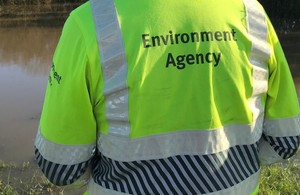Brothers sentenced over vehicles stored at illegal waste site
Rickman brothers failed to remove end of life vehicles from scrap yard operating without a permit.

Two men have been convicted of waste crime after depositing, storing and dismantling end of life vehicles at their site without authorisation from the Environment Agency.
Robert and Barry Rickman have been sentenced after they pleaded guilty at West Hampshire Magistrates Court. Robert Rickman - who operated a regulated facility illegally, namely a waste operation for the deposit, treatment and storage of waste, specifically end of life vehicles - was handed 4 months imprisonment suspended for 12 months. Robert Rickman was also handed a 150 hours Community Service Order and ordered to pay costs of £1,000 and a Victim Surcharge of £128.
Barry Rickman was prosecuted for knowingly permitting the operation of a regulated facility illegally, namely a waste operation for the deposit, treatment and storage of waste and was fined £2,000 and ordered to pay costs of £1,000 and Victim Surcharge of £190.
The Environment Agency prosecuted 68 year old Robert Rickman of Rickman’s Scrapyard, Mead End Road, Lymington, and 64 year old Barry Rickman of Heron Close, Lymington, after a member of the public reported that burning was taking place at the site.
Environment Agency and police officers attended the site at Mead End Road to find that the scrap yard was being operated illegally and 150-200 vehicles and numerous car parts were stored across the site. An Environment Agency officer explained to Mr Rickman that he needed a permit, but Mr Rickman stated he would clear the site. The officer noted that there was no area of hard standing, drainage or other infrastructure to be able to operate legally, which was a risk of pollution to the local environment.
The Environment Agency and New Forest District Council met with both Robert and Barry Rickman to produce a plan to remove the vehicles from the site over a 12 month period. After many site visits it was clear that very few vehicles had been removed.
Nick Gray, Acting Area Director for the Environment Agency, said:
We gave Robert and Barry Rickman every opportunity to clear the site, which they did not do. The waste came from innocent members of the public, unaware their vehicles were being stored and dismantled illegally, which undermined legitimate waste operators and blights the local community and environment.
The conviction of the Rickmans serves as a reminder to people who exploit the waste industry that we are dedicated to pursuing law-breakers from the crime to the courtroom. We encourage anyone who is suspicious of potential waste crime activity to report it to us on 0800 807060.
Further information
The offence Mr Robert Rickman has committed is contrary to regulations 12(1), 38(1)(a) and 39(1) of the Environmental Permitting (England and Wales) Regulations 2016. The offence Mr Barry Rickman has committed is contrary to Regulation 12(1)(a) and 38(1)(b) of the Environmental Permitting (England and Wales) Regulations 2016 Regulations.
Both Mr Robert Rickman and Mr Barry Rickman were also issued with a court order under the provisions of Regulation 44 of the Environmental Permitting (England and Wales) Regulations 2016, requiring them to remove all remaining end of life vehicles (ELVs) and waste from the land in question within the next 12 months. There are currently in excess of 30 ELVs plus waste vehicle parts left on the site.
From 6 April 2010 anyone operating a regulated facility to recover or dispose of waste can only do so in accordance with an environmental permit granted under the Environmental Permitting Regulations. An environmental permit is granted subject to a number of conditions to protect the environment and local communities from potentially harmful substances and requiring appropriate management systems and infrastructure to be in place prior to commencing any waste activities.
Sites for the processing of waste vehicles must be secure against unauthorised access and the escape of waste. Infrastructure must be designed to capture and contain any spillages. Liquids and vehicle batteries must be stored in secure containers.
The standards for processing waste vehicles are different depending on whether vehicles have been ‘depolluted’. Depollution involves the removal under controlled conditions of liquids such as oil and brake fluid and potentially explosive substances such as charges in air bags but also includes the removal of tyres if stored for a period of time. Vehicles which have not been depolluted are classified as hazardous waste and must be stored on an impermeable surface. If a vehicle is depolluted, any pollution risk associated with it will be significantly reduced and it will no longer be classified as hazardous waste